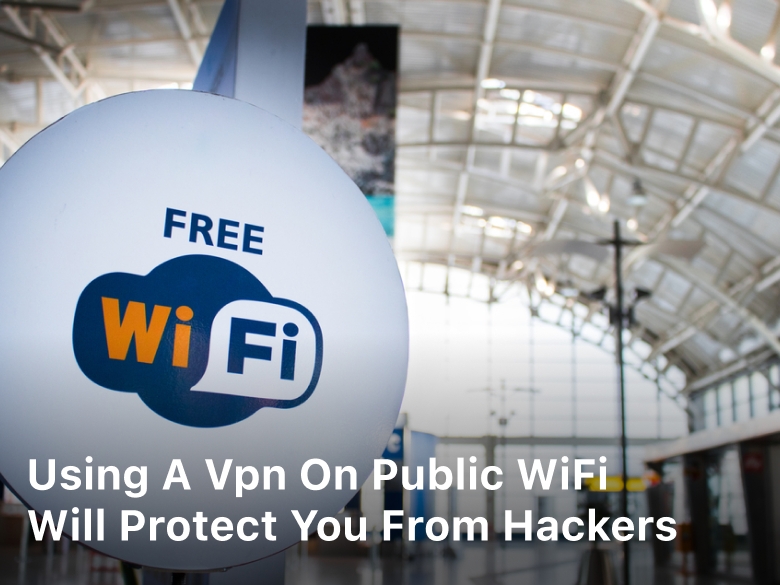
Using a VPN on Public WiFi Will Protect you From Hackers – Discover how using a VPN on public WiFi can significantly enhance your online security. Learn how VPNs safeguard your sensitive information from hackers and stay protected while browsing on the go.
In today’s digital age, the convenience of public WiFi networks is undeniable. Whether you’re enjoying a cup of coffee at your favorite cafe or waiting for a flight at the airport, accessing the internet has never been easier.
However, this convenience comes with a significant risk – the threat of hackers lurking on public WiFi networks. Fear not, as this article unveils a powerful solution: using a VPN (Virtual Private Network) on public WiFi.
We’ll delve into the world of online security, explaining how this simple yet effective tool can protect you from hackers and ensure your sensitive data remains safe and sound.
Using a VPN on Public WiFi Will Protect You From Hackers
Using a VPN on public WiFi is like donning a suit of armor before heading into battle. It forms an encrypted tunnel between your device and the internet, shielding your online activities from prying eyes.
When you connect to a public WiFi hotspot, hackers are on the prowl, seeking vulnerabilities to exploit. With a VPN, your data becomes unintelligible to anyone attempting to intercept it, ensuring your private information remains just that – private.
How Does a VPN Work?
A VPN acts as a digital cloak, obscuring your online identity and location. When you access the internet through a VPN, your data travels through a secure server before reaching its destination.
This server assigns you a new IP address, making it appear as though you’re browsing from a different location. As a result, hackers trying to trace your online activity are left chasing shadows.

The Key Benefits of Using a VPN on Public WiFi
1. Data Encryption
Using a VPN encrypts your data, rendering it unreadable to unauthorized parties. Even if hackers manage to intercept your information, they’ll be met with a jumble of characters that’s virtually impossible to decipher. This encryption ensures that your passwords, credit card details, and other sensitive information remain secure.
2. Anonymous Browsing
When you connect to a public WiFi network, you expose your device’s IP address – a unique identifier. Hackers can exploit this vulnerability to track your online movements.
By using a VPN, you mask your IP address, preserving your anonymity and making it extremely challenging for hackers to trace your digital footprint.
3. Safe Financial Transactions
Public WiFi networks are a prime hunting ground for hackers looking to steal financial information. Using a VPN adds an extra layer of security when conducting online transactions. It shields your payment details from cybercriminals, allowing you to shop and bank with peace of mind.
4. Access Restricted Content
VPNs can also grant you access to content that might be restricted in your current location. Whether it’s streaming a show or accessing a website, a VPN can make it appear as though you’re browsing from a different country, bypassing geographical restrictions.
5. Mitigating the Risk of Cyberattacks
Hackers often exploit public WiFi to launch cyberattacks. Using a VPN significantly reduces this risk, protecting both individuals and businesses from potential data breaches, malware infections, and other cyber threats.
Frequently Asked Questions (FAQs)
Q: Can I use a VPN on any device?
Yes, VPNs are compatible with various devices, including smartphones, tablets, laptops, and desktop computers. You can protect all your devices by installing a VPN application and connecting to secure servers.
Q: Are there any drawbacks to using a VPN?
While VPNs offer numerous benefits, they may slightly slow down your internet connection due to the encryption process. However, the trade-off between speed and security is well worth it.
Q: Is it legal to use a VPN?
Yes, using a VPN is legal in most countries. However, it’s important to note that while a VPN itself is legal, using it for illegal activities remains prohibited.
Q: How do I choose the right VPN service?
When selecting a VPN service, consider factors such as server locations, connection speed, encryption protocols, and customer support. Reading reviews and researching reputable providers will help you make an informed decision.
Q: Can a VPN completely eliminate the risk of hacking?
While a VPN significantly enhances your online security, it’s not a foolproof solution. Practicing good cybersecurity habits, such as using strong passwords and regularly updating your software, is essential alongside using a VPN.
Q: Is a paid VPN better than a free one?
Paid VPN services often offer more advanced features, better customer support, and higher levels of security compared to free options. If you’re serious about your online security, investing in a reputable paid VPN is recommended.
Conclusion
In a world where hackers are constantly on the lookout for vulnerable targets, using a VPN on public WiFi provides a crucial line of defense.
With its data encryption, anonymous browsing, and safeguarding capabilities, a VPN ensures your online activities remain private and protected.
So, the next time you’re sipping a latte at the local cafe or catching up on emails at the airport, remember that using a VPN on public WiFi will indeed protect you from hackers and grant you the peace of mind you deserve.
Keep Reading :
- How to Find IP Address of My Desktop
- How to Change VPN Location
- What is a Virtual Private Network VPN
- How To Turn Off VPN On Iphone
- How To Change My Public IP Address Without VPN





